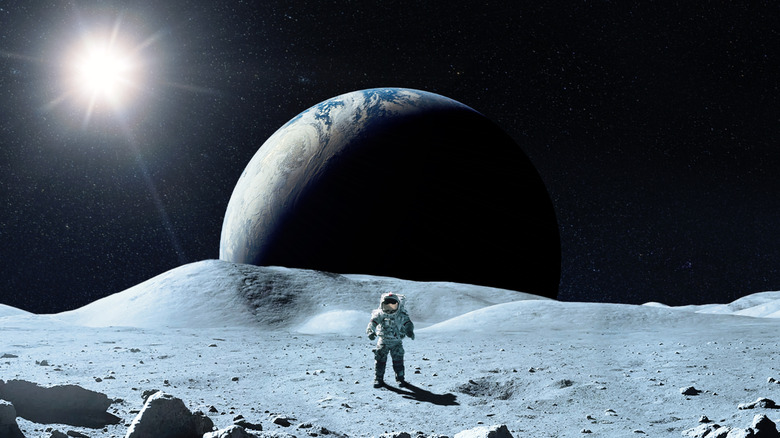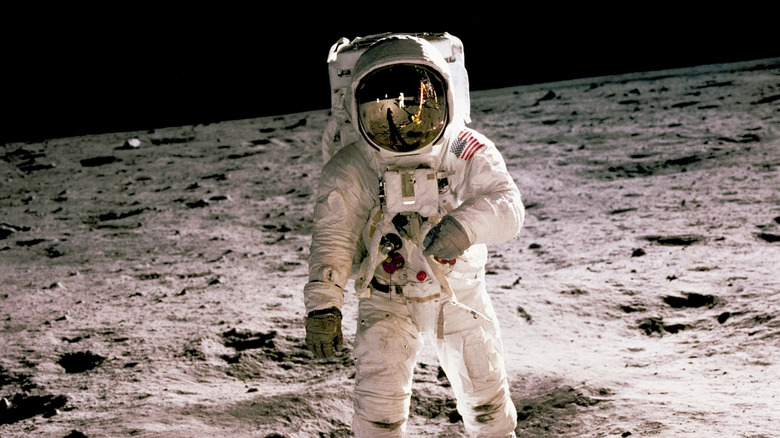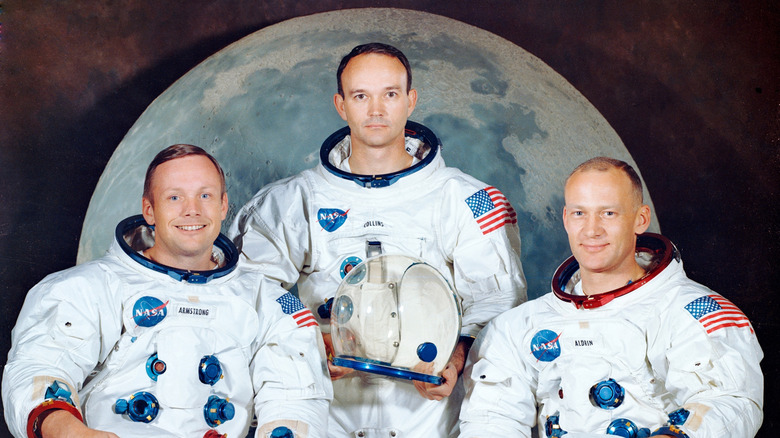What Neil deGrasse Tyson Really Thinks About The Moon Landing Being 'Fake'
On July 20, 1969, Neil Armstrong delivered his famous "one small step for a man, one giant leap for mankind" line as he became the first human in history to set foot on the moon's surface. The event was witnessed by 650 million people via their televisions, making for one of the most significant and important scientific and cultural moments in the history of humankind. Four days later, on July 24, 1969, Apollo 11 completed President John F. Kennedy's goal to carry out a successful crewed lunar landing and return to Earth, with Commander Neil Armstrong, Command Module Pilot Michael Collins, and Lunar Module Pilot Edwin "Buzz" Aldrin touching down in the north Pacific Ocean.
The moon landing had a profound effect on the world, but ever since, rather than simply enjoying a lasting legacy as one of humankind's most awe-inspiring achievements, everyone's just been arguing about whether the moon landing was fake or not. That is to say that a small but vocal proportion of people actually believe that this event, witnessed by millions of people, was all a big ruse. According to a 2021 survey by the University of New Hampshire, 12% of 1,134 U.S. adults agreed that NASA did not land of the moon. That's a relatively small sample size, but it was at least nationally representative in terms of age, gender, race, education, and political party. Over in the U.K., a 2019 YouGov poll revealed that one in six British people agreed with the statement: "The moon landings were staged." Other reports have claimed that as many as 20% of Americans believe the moon landing was fake, but that has been called into question by experts.
Either way, the moon landing conspiracy persists, and there are many reasons as to why. For Neil deGrasse Tyson, however, none of them are justifiable, as the prominent public intellectual considers it nigh on impossible for the U.S. government to have pulled off a hoax of this scale.
Neil deGrasse Tyson thinks it would have been harder to fake the moon landing
Ironically, moon landing conspiracists are arguably responsible for keeping the memory of the event alive in the public consciousness more so than any other group, including NASA. Conversations about whether the moon landing was faked or not continue more than half a century after Neil Armstrong first stepped onto the lunar surface, with conspiracists pointing to what they claim are telltale signs that footage of the landing was actually shot on some secret soundstage. The lack of stars in photos, is one example, or the way in which the U.S. flag appears to wave in the wind. There are, of course, explanations for both. If you spend five minutes looking it up, you'll find there is a very good reason why you can't see stars in most space photos but you can from Earth. The flag waving, meanwhile, was a result of astronauts twisting the pole as they planted the flag in the ground.
But for Neil deGrasse Tyson, all of these explanations are beside the point. In an interview with publisher Penguin, the prominent astrophysicist was asked questions on a range of topics including climate change and AI. But he started out by addressing moon landing conspiracy theories, and dismissed them outright. "Have you really thought about what it would take to fake the moon landing?" He said. "Because the rocket did launch, we all saw the rocket launch, okay so there's hardware there, there are office buildings of blueprints for the design of the Saturn 5 rocket, hundreds of engineering hours that went behind this and the records of those designs." As Tyson sees it, then, faking the moon landing would have been a more difficult enterprise than actually sending a crew to the moon in the first place. He continued: "If you wanted to fake the moon landing you would have to fake all of these documents and it just seems to me it's way easier to just go to the moon. Has anyone considered that? Just go to the moon, that's easier than faking all of this."
A study backs up Neil deGrasse Tyson's claims
Though it's sort of exciting to think that Stanley Kubrick shot the moon landing on a soundstage, conspiracy theories of this sort have been thoroughly debunked. Every point raised by conspiracists has a convincing rebuttal and the whole thing is a moot point at this stage. That's certainly the case for Neil deGrasse Tyson, who has previously revealed his grim prediction for the future of our own planet. While his answer in the Penguin interview might seem simplistic in that it doesn't tackle any specific claims of conspiracists beyond the contention that the landing was fake, Tyson doesn't want to get into the weeds on this topic because people have been doing that for decades and the preponderance of evidence in favor of the moon landing taking place is overwhelming.
What's more, there have been studies carried out that show Tyson's argument is perfectly reasonable. A 2016 study published in PLOS One looked at individuals' tendency to believe that events are secretly manipulated by clandestine groups and organizations. The study, written by Oxford physicist Dr. David Robert Grimes, involved the use of a mathematical model for conspiracies based on previous known scandals and real-life conspiracies, and factored in what influenced a conspiracy's success or failure. Grimes then used the model to estimate the likelihood that popular conspiracy claims, including the moon landings being faked, were accurate. The model showed that such conspiracies would almost certainly fail even given the most generous estimates of participants' ability to keep the secret.
Researchers detailed that large-scale conspiracies involving more than 1,000 people would quickly become "untenable" and that at least 411,000 people would have to have been in on the fake moon landing in order for it to have been carried out in the first place. By Dr. Grimes' estimates, then, the truth would have come to light three years and eight months after the event. In that sense, there's pretty convincing evidence that Tyson is right to say it probably would have been a lot easier to just go to the moon than fake the whole thing.


